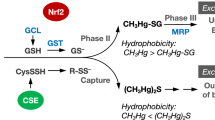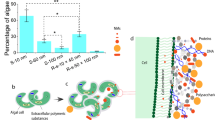Abstract
THE biosynthesis of methyl mercury from mercuric ion, by microorganisms which live in sediments polluted with mercury, is of special significance to the bio-accumulation of mercury1–3. Although the mechanism of methyl mercury biosynthesis is understood to a large extent at the molecular level4–6, very little is known about the mechanisms of molecular interaction in both the bio-accumulation and the neurotoxicity of this compound. It is clear that ingestion by humans of food contaminated by methyl mercury leads to the synthesis of methyl mercury chloride in the stomach, and this, being very non-polar, is easily transported into the blood stream7. The distribution of methyl mercury in animals is characteristically different from that of inorganic mercury, in that alkyl mercury compounds have a tendency to partition into the lipids, or hydrophobic regions of the cell8.
This is a preview of subscription content, access via your institution
Access options
Subscribe to this journal
Receive 51 print issues and online access
$199.00 per year
only $3.90 per issue
Buy this article
- Purchase on Springer Link
- Instant access to full article PDF
Prices may be subject to local taxes which are calculated during checkout
Similar content being viewed by others
References
Jensen, S., and Jernelöv, A., Nordforsk, 14, 3 (1968).
Wood, J. M., Kennedy, F. S., and Rosen, C. G., Nature, 220, 173 (1968).
Wood, J. M., Science, N. Y. (in the press).
Hill, H. A. O., Pratt, J. M., Ridsdale, S., Williams, F. R., and Williams, R. J. P., Chem. Commun, 6, 341 (1970).
Bertilsson, L., and Neujahr, H., Biochemistry, 10, 2805 (1971).
DeSimone, R. E., Penley, M. W., Charbonneau, L., Smith, S. G., Wood, J. M., Hill, H. A. O., Pratt, J. M., Ridsale, S., and Williams, R. J. P., Biochim. biophys. Acta, 304, 851 (1973).
Wood, J. M., Revue Internationale D'Oceanographie Medicale (in the press).
Berlin, M., and Ullberg, S., Archs envir. Hlth, 6, 602 (1963).
Takeuchi, T., in Minamata Disease (edit. by Kuksuna, M., 141 (Kumamoto University, Japan, 1968).
Takeuchi, T., Biological Reactors and Pathological Changes of Human Beings and Animals Under the Condition of Organic Mercury Poisonings, 1, 1 (University of Michigan, Ann Arbor, 1970).
Wood, J. M., Advances in Environmental Science and Technology (edit. by Pitts, T. N., and Metcalf, R, L.) 2, 39 (Wiley, Interscience, 1971).
Salvaterra, P., Lown, B., Morganti, T., and Massaro, E. J., Acta pharmac. tox., 32, (in the press).
Budzikiewicz, H., Djerassi, C., and Williams, D. H., Interpretation of Mass Spectra of Organic Compounds, 399 (Holden Day, San Francisco, 1967).
Author information
Authors and Affiliations
Rights and permissions
About this article
Cite this article
SEGALL, H., WOOD, J. Reaction of methyl mercury with plasmalogens suggests a mechanism for neurotoxicity of metal-alkyls. Nature 248, 456–458 (1974). https://doi.org/10.1038/248456a0
Received:
Issue Date:
DOI: https://doi.org/10.1038/248456a0
This article is cited by
-
Trace Element Concentrations in Feathers of Flesh-footed Shearwaters (Puffinus carneipes) from Across Their Breeding Range
Archives of Environmental Contamination and Toxicology (2011)
-
Hg2+ and Cd2+ interact differently with biomimetic erythrocyte membranes
BioMetals (2009)
-
Biological processes involved in the cycling of elements between soil or sediments and the aqueous environment
Hydrobiologia (1987)
-
Methyl mercury effect on rat liver mitochondrial deshydrogenases
Experientia (1975)
-
Biological cycles for elements in the environment
Die Naturwissenschaften (1975)
Comments
By submitting a comment you agree to abide by our Terms and Community Guidelines. If you find something abusive or that does not comply with our terms or guidelines please flag it as inappropriate.



